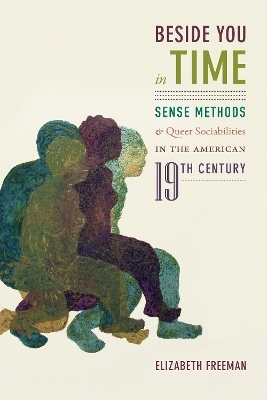
Beside You in Time
Sense Methods and Queer Sociabilities in the American Nineteenth Century
Seiten
2019
Duke University Press (Verlag)
978-1-4780-0635-0 (ISBN)
Duke University Press (Verlag)
978-1-4780-0635-0 (ISBN)
Elizabeth Freeman expands bipolitical and queer theory by outlining a temporal view of the long nineteenth century and showing how time became a social and sensory means by which people resisted disciplinary regimes and assembled into groups in ways that created new forms of sociality.
In Beside You in Time Elizabeth Freeman expands biopolitical and queer theory by outlining a temporal view of the long nineteenth century. Drawing on Foucauldian notions of discipline as a regime that yoked the human body to time, Freeman shows how time became a social and sensory means by which people assembled into groups in ways that resisted disciplinary forces. She tracks temporalized bodies across many entangled regimes—religion, secularity, race, historiography, health, and sexuality—and examines how those bodies act in relation to those regimes. In analyses of the use of rhythmic dance by the Shakers; African American slave narratives; literature by Mark Twain, Pauline Hopkins, Herman Melville, and others; and how Catholic sacraments conjoined people across historical boundaries, Freeman makes the case for the body as an instrument of what she calls queer hypersociality. As a mode of being in which bodies are connected to others and their histories across and throughout time, queer hypersociality, Freeman contends, provides the means for subjugated bodies to escape disciplinary regimes of time and to create new social worlds.
In Beside You in Time Elizabeth Freeman expands biopolitical and queer theory by outlining a temporal view of the long nineteenth century. Drawing on Foucauldian notions of discipline as a regime that yoked the human body to time, Freeman shows how time became a social and sensory means by which people assembled into groups in ways that resisted disciplinary forces. She tracks temporalized bodies across many entangled regimes—religion, secularity, race, historiography, health, and sexuality—and examines how those bodies act in relation to those regimes. In analyses of the use of rhythmic dance by the Shakers; African American slave narratives; literature by Mark Twain, Pauline Hopkins, Herman Melville, and others; and how Catholic sacraments conjoined people across historical boundaries, Freeman makes the case for the body as an instrument of what she calls queer hypersociality. As a mode of being in which bodies are connected to others and their histories across and throughout time, queer hypersociality, Freeman contends, provides the means for subjugated bodies to escape disciplinary regimes of time and to create new social worlds.
Elizabeth Freeman is Professor of English at the University of California, Davis, and the author of Time Binds: Queer Temporalities, Queer Histories and The Wedding Complex: Forms of Belonging in Modern American Culture, both also published by Duke University Press.
Acknowledgments vii
Introduction 1
1. Shake it Off: The Physiopolitics of Shaker Dance, 1774–1856 27
2. The Gift of Constant Escape: Playing Dead in African American Literature, 1849–1900 52
3. Feeling Historicisms: Libidinal History in Twain and Hopkins 87
4. The Sense of Unending: Defective Chronicity in "Bartleby, the Scrivener" and "Melanctha" 124
5. Sacra/Mentality in Djuna Barnes's Nightwood 158
Coda. Rhythm Travel 187
Notes 191
References 199
Index 219
| Erscheinungsdatum | 06.09.2019 |
|---|---|
| Verlagsort | North Carolina |
| Sprache | englisch |
| Maße | 152 x 229 mm |
| Gewicht | 340 g |
| Themenwelt | Geschichte ► Teilgebiete der Geschichte ► Kulturgeschichte |
| Geisteswissenschaften ► Sprach- / Literaturwissenschaft ► Anglistik / Amerikanistik | |
| Geisteswissenschaften ► Sprach- / Literaturwissenschaft ► Literaturgeschichte | |
| Geisteswissenschaften ► Sprach- / Literaturwissenschaft ► Literaturwissenschaft | |
| Sozialwissenschaften ► Soziologie ► Gender Studies | |
| ISBN-10 | 1-4780-0635-8 / 1478006358 |
| ISBN-13 | 978-1-4780-0635-0 / 9781478006350 |
| Zustand | Neuware |
| Haben Sie eine Frage zum Produkt? |
Mehr entdecken
aus dem Bereich
aus dem Bereich
der stille Abschied vom bäuerlichen Leben in Deutschland
Buch | Hardcover (2023)
C.H.Beck (Verlag)
23,00 €


